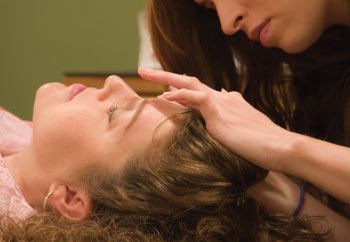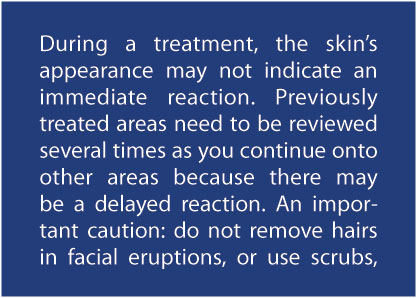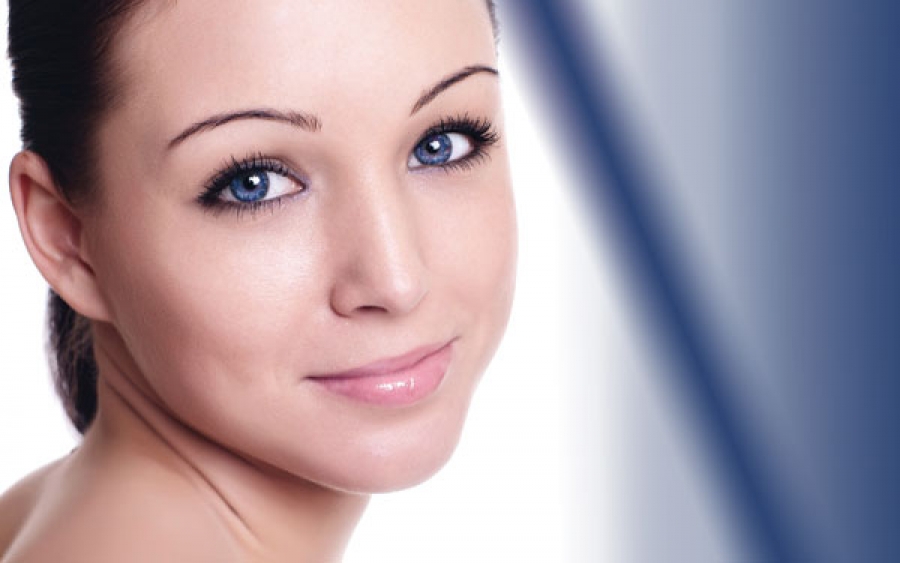I've treated many college students during exam time, when they were under extreme stress. Many had hyper-reactive and sensitive skin, which could also break out. This is fairly common. Some of the students used internal or external medications to improve their skin. Whether or not they had taken or used anything, most students’ skin returned to normal after the anxiety was over. The skin’s appearance often changes with a new or challenging event, such as starting a new job, getting married, dating someone new, etc.
Double Exposure Stress in Your Mind and in Your Skin
The skin often reflects our internal state or how we cope with stressful conditions. For some individuals, life is always filled with constant worry. Consequently, their skin usually is more sensitive than others. Although stress can be seen on the skin, there may not be a significant change other than heightened sensitivity. For others, ongoing stress can turn skin shades lighter and skin that once appeared smooth, tight-pored, and silky may react to less than a gentle touch. When the skin swells up from scratching an itchy spot or welts up from the slight touch of a fingernail, the remaining impression signals a “hyper reaction." This is a signal to take more time to sleep, de-stress, let go of the worries, and be more careful with your overall health. Don’t add anything more into your life if you can, as then you will only add to the problem. More sleep seems to help relax the body and mind, which in turn gives you more control. I have discovered that skin can become hypersensitive when you’re overly upset, keep emotions inside, get excited or hurt, or when you’re sleep-deprived. Weather and environmental influences also have effects, as well as poor nutrition.
There is a distinction between the driven types, who may have higher levels of stress but might thrive on it, and others who have less stress but don’t have a clue or are not in touch with this experience and seem to manage their skins response. Those in control of their situations often have skin which reflects this. I believe that we can train ourselves to have an automatic coping system using deep relaxation techniques or previous examples of success. Your clients can achieve tranquility through many disciplines, including self-hypnosis, meditation, and being certain they can handle whatever comes their way. This quickly reduces the level of pressure one feels.
It is not always necessary to cut back on responsibilities to reduce tension. For example, individuals that have fewer skin problems feel more confident and prepared. They manage their emotions even when they are busy. Exercise is one easy method that reduces stress and releases harmful toxins the body stores during these difficult times. One alternative idea to gain control: Be careful you don’t add more stress with a workout that is really hard. You need to know what your body can handle without it causing a new problem.
Our reactions to what we view as stressful can be controlled by our mind and attitude. The mind and body can control how relaxed we are. In a peaceful state of mind, emotional strains can be tolerated. However, under pressure or excessive negative conditions, the mind sends signals that can cause the skin to react. Allergies and other physical symptoms can also escalate under bad conditions. I have noticed that those who deal with stress confidently, creatively, and realistically in their lives can achieve greater success with most skin treatments and procedures than individuals who do not cope well, have ongoing and constant demands, or are sleep deprived.
 Stress and Increased Hair Growth and Skin Conditions
Stress and Increased Hair Growth and Skin Conditions
I recognize stress as one overlooked, underlying cause of excess hair growth and skin disorders, loss of elasticity, over-sensitivity, why faster hair growth and even hair loss. As a hair removal expert and hypnotherapist, I’ve found this connection to be irrefutable. It’s believed that stress leads to an increase in the levels of androgens in the bloodstream. Increased androgens cause more hair growth.
The relationship between psychological and physical stress and organ function is quite complex. One pathway in which stress, the brain, and pituitary and adrenal glands may interact has been outlined by endocrinologist Dr. Walter Futterweit. “Stress induces the release of hypothalamic neurotransmitters,” he says. “These then cause the pituitary to secrete ACTH (adreno-corticotrophic hormone), which directly stimulates an adrenal response. The adrenal gland releases a group of hormones, such as glucocorticoids, as well as androgens and estrogens (cortisol, corticosterone).”
In other words, in response to stress, the pituitary gland, located at the base of the brain, produces ACTH. ACTH stimulates the entire adrenal cortex (the outer portion of the gland), and a variety of syndromes may result, depending upon which hormone or group of hormones are increased. The androgens circulating in the bloodstream may cause fine, soft body hair to grow as coarse, more noticeable dark hair (hirsutism). Anthony E. Karpas, MD, in The Adrenal As a Source of Androgens, states, “The adrenal gland is the stress gland of the body. Both physical and psychological stress may increase adrenal-androgen production via an increase in ACTH.”
While stress elevates the male hormone that produces excess hair, individuals now seem more aware of problems caused by stress reactions, including excessive hair growth, and use this knowledge to control their stress levels. Since writing Electrologist or Psychotherapist (see DERMASCOPE, March 1991), I have found many differences between the ways an individual’s skin reacts to electrolysis treatments or waxing, now versus 10 years ago. Ingrown hairs occur more frequently during these times as well.

Young women in today’s society are expected to accept responsibility for their own lives. In previous generations, a lot of women were taught to depend more on others. Many had difficulty adapting to personal responsibility, growth, and gaining status as autonomous, self-dependent individuals. Since beginning my career in 1977, my experiences have led me to believe that the stress women of previous generations endured in order to reach a level of autonomy and self-dependence may account for greater instances of excessive hair growth and adult onset acne.
 Solutions
Solutions
Although I believe stress reactions can be controlled by the mind, endocrinologists and internists frequently prescribe medications when hair growth and skin is out of control. Some birth control pills reduce acne and excess hair growth. Patients interested in this option should certainly consult their doctors about the pros and cons.
Safe Treatments
Treating different individuals requires an understanding of the signs of stress and comprehensive skin analysis. The client may not always be aware of his or her skin’s sensitivity.
For the most successful treatment, the best time to schedule is when the client is not under a lot of stress. Find out if he or she has recent physical trauma, excessive exertion, or emotional overload. Severe stress inhibits the optimal desired result of treatments for individuals who are susceptible to “stress reactions.” Tight pored skin cannot be cleaned as thoroughly with a facial, and hair removal treatments can easily affect the skin. Practitioners can suggest relaxation techniques to clients who are under pressure. They should help clients relax before working on their skin to achieve a healthier state of mind and body for the best results.
It is a professional’s obligation to be aware of any changes or physical reactions in the skin during a process such as skin discoloration or blotchiness, as they are signals the skin will be more sensitive.
If you notice the skin reacts a lot, it’s better to diplomatically tell the client that it’s not a good time for the treatment. If this is not an option, adjust the equipment settings, lower the heat, or use a weaker treatment option… or try a different approach not to risk skin damage and a poor treatment result. The client will have greater respect and appreciate the technician’s concern for his or her well-being.
Beauty, health and well-being researcher and consumer self-protection advocate Vivian Orgel’s pioneering advancements puts professionals and consumers on alert with often unobvious reasons for skin reactions and other concerns. The New York Times, GQ, Essence, Seventeen and many other consumer publications consult her for her in-depth attention to underreported topics. Her interviews with ground-breaking experts include experts in these fields: hair removal and loss, endocrinology, dermatology, gynecology, laser applications, nutrition, etc. Her mind-body experience continues to lead her to educate readers on skin care safety, regarding salon, physician, or at-home treatments. This email address is being protected from spambots. You need JavaScript enabled to view it.
